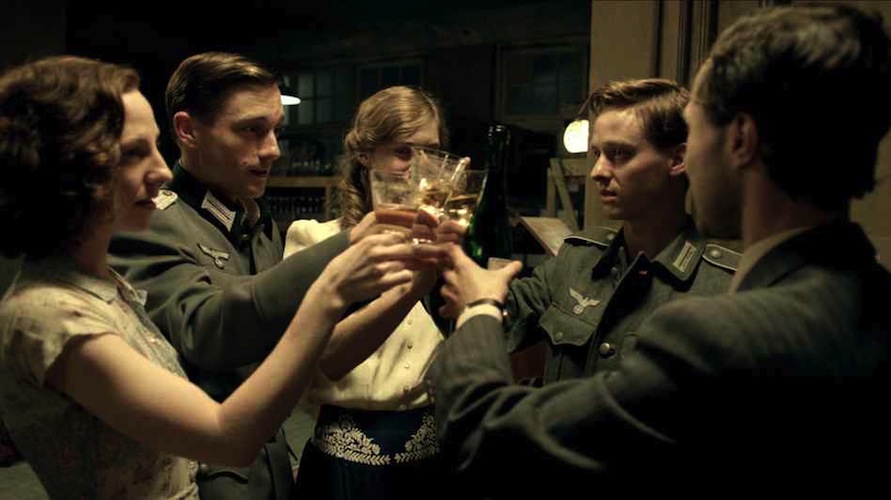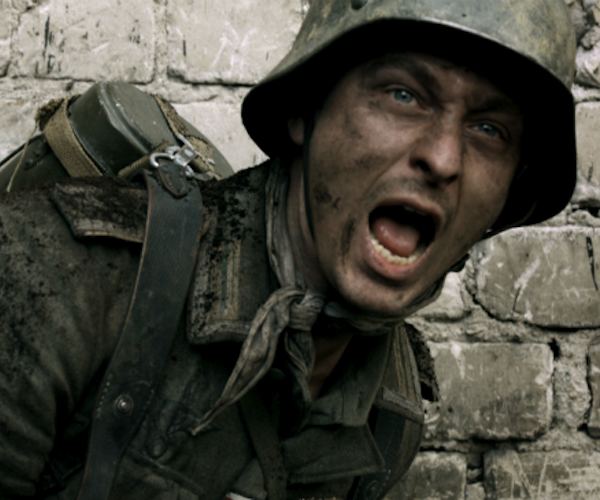Fuse Movie Review: “Generation War, Parts One and Two” — A Soft Core Version of Nazism?
Everyone is a bit more stupid than they need to be in this movie, both the Germans and the Jews.
Generation War, Parts One and Two. Directed by Philipp Kadelbach.

From left: Katharina Schüttler, Volker Bruch, Miriam Stein, Tom Schilling, and Ludwig Trepte in “Generation War.” Photo: Music Box Films
By Harvey Blume
Do you remember Holocaust, a mini-series for German television that aired in the late seventies and was much praised for showing that Germany had finally cleared the air and come to terms with its genocidal past? The image that most stays with me is from the last installment: World War II is over and back in the village that is home base for the series one old-timer points a knobby finger up toward an attic apartment and says: there, there, that’s where the Nazi lived.
“The Nazi.” Singular. Suggesting that in the Deutschland of that time to be a Nazi was odd or aberrant, and that a Nazi could be found nesting only in the occasional attic.
So far as clearing the air and coming to terms with that epoch goes, it cannot be doubted that a new miniseries for German television, cobbled together into a movie — Generation War, Parts One and Two — goes much further. There are no lack of Nazis. The Fuhrer is universally acclaimed. And yet this film is as unsatisfying, as vapid, in its way as its predecessor.
The film starts in a Berlin cabaret where five friends, in the full bloom of youth, are drinking to each other and proposing — as a well known Russian proverb expressly denies — that life is a walk across an open field. France has fallen. These kids can hardly wait for the Eastern Front to open. Moscow — what fun to go there? — can’t be far away. The five friends — a photograph of them taken that evening carries through the film in each of their possessions — are, so Generation War proposes, decent kids, caught up in the national enthusiasm and folly endemic to their day and age.
We are meant to empathize with them as they discover that life is anything but an open field, and that, for instance, so far as the Eastern Front is concerned, Moscow is infinitely far away. But I, for one, didn’t empathize with them. From the start I wished them ill, everyone of them, except the Jewish lover of the woman who wants to be the new Marlene (but is told to throttle that ambition by a Gestapo paramour who informs her that Marlene Dietrich — who fled Deutschland and opposed Hitler — is to be spoken of no more.)
As for the rest: where were they when Hitler came to power? What were their views? None are offered. Everything is groovy, provided Moscow is a cakewalk away. They are disabused of Moscow’s proximity as Generation War: Part One proceeds. Ivan proves to be hardy. Partisans proliferate and Russian winters are utterly inconceivable. Why has The Fuhrer failed to provide proper winter gear?
Some suffer qualms about what they are doing. Is it OK to kill a whole family on suspicion one might have mined a well? Is it OK to kill every Jew you find, including children? But this confusion, as others have pointed out, is ahistorical. Many German units — the Einsatzgruppen — were dedicated explicitly to the extermination of all Jews they found. They were the far-flung lead-up to Auschwitz. Such murders, in this film, are pictured as disorganized, spontaneous events. As if genocide, in German hands, was ever less than organized. (See Ordinary Men by Christopher Browning for a more realistic version of the Einsatzgruppen.)
And then there are the Jews. Yes the Germans in that initial photograph are subject to what is, to my mind, unforgivable naiveté. But what about the Jew? Is he entitled, for a Jew in Germany circa 1941, to be so ignorant? What about the Jewish woman who inveigles herself into German forces as a nurse. Why? Is she a partisan or just a fool? We never know. We do know what happens to her when she is outed as a Jew.
Everyone is a bit more stupid than they need to be in this movie, both the Germans and the Jews. It’s an intellectually soft core version. I longed, at times, for Fassbinder, and his excoriating view of Germany.
My review, thus far, is based on seeing only the first part of Generation War. I will see the second part tomorrow, not only for the sake of closure but because I want to savor how the Germans instead of going to Moscow go to hell. The Battle of Kursk is coming, where German armored divisions run into their Soviet counterparts and, to put it plainly, the Blitzkrieg definitively tanks.
Postscript: my plan to see Generation War: Part Two was foiled due to the film disappearing from the Kendall Theater without even a single weekend showing. I gather, though, that despite some controversy, Generation War was an unprecedented smash in Germany.
Harvey Blume is an author — Ota Benga: The Pygmy At The Zoo — who has published essays, reviews, and interviews widely, in the New York Times, Boston Globe, Agni, The American Prospect, and The Forward, among other venues. His blog in progress, which will archive that material and be a platform for new, is here. He contributes regularly to The Arts Fuse and wants to help it continue to grow into a critical voice to be reckoned with.


I decided to skip this one the moment I heard the opening scenes described in a review on the radio — in part because of the naïveté you noted of both the Jewish character and the that of his German friends who seem unaware of the the changes in German society that had occurred in the preceding eight years. Quite simply, by the time the war broke out, at least two-thirds of Germany’s Jews had already left the country. The anti-Semitism, both official and unofficial, had created such a clear and present danger that the only Jews left in Germany were ones too poor to leave.